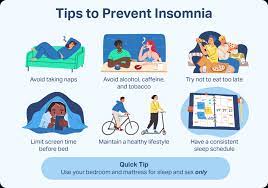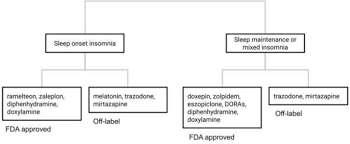Chronic Insomnia Treatment: Restoring Healthy Sleep Patterns
Insomnia, a common sleep disorder, affects millions of people worldwide. While occasional sleepless nights are normal, chronic insomnia can have a significant impact on one’s quality of life. If you find yourself struggling to fall asleep or stay asleep for more than three nights a week for at least three months, it’s important to seek treatment for chronic insomnia.
The Impact of Chronic Insomnia
Chronic insomnia can lead to various physical and mental health issues. Sleep deprivation affects cognitive function, leading to difficulties with concentration, memory, and decision-making. It can also contribute to mood disorders like depression and anxiety.
Moreover, chronic insomnia takes a toll on the body’s immune system, increasing the risk of developing chronic conditions such as cardiovascular disease, diabetes, and obesity. Additionally, it can impair motor skills and coordination, increasing the likelihood of accidents and injuries.
Treatment Approaches for Chronic Insomnia
Fortunately, there are effective treatment approaches available to manage chronic insomnia and restore healthy sleep patterns. It is essential to work closely with healthcare professionals who specialize in sleep medicine to determine the most suitable treatment plan for your specific needs.
Cognitive Behavioral Therapy for Insomnia (CBT-I)
Cognitive Behavioral Therapy for Insomnia (CBT-I) is considered the gold standard treatment for chronic insomnia. It focuses on identifying and modifying negative thoughts and behaviors associated with sleep difficulties. CBT-I helps individuals develop healthy sleep habits, establish a consistent sleep schedule, and manage stress that may interfere with sleep.
Medications
In some cases, healthcare providers may prescribe medications to manage chronic insomnia. These medications can include sedatives, hypnotics, or antidepressants. However, it’s important to note that medication should be used under the guidance of a healthcare professional and only as a short-term solution.
Lifestyle Modifications
Lifestyle modifications play a crucial role in managing chronic insomnia. These include:
- Establishing a regular sleep schedule by going to bed and waking up at consistent times
- Creating a relaxing bedtime routine to signal the body that it’s time to sleep
- Avoiding stimulants like caffeine and nicotine close to bedtime
- Creating a sleep-friendly environment with comfortable bedding, proper lighting, and noise reduction
- Incorporating regular physical activity into your daily routine
- Managing stress through relaxation techniques such as meditation or deep breathing exercises
Complementary Therapies
In addition to conventional treatment approaches, complementary therapies can also support the management of chronic insomnia. Techniques such as aromatherapy, acupuncture, and mindfulness meditation have shown promising results in improving sleep quality for some individuals.
The Importance of Seeking Treatment for Chronic Insomnia
Neglecting chronic insomnia can lead to worsening symptoms and further complications. It is crucial to seek treatment early on to prevent long-term negative impacts on both physical and mental health.
If you are experiencing chronic insomnia symptoms, consult with a healthcare professional who specializes in sleep medicine. They will conduct a comprehensive evaluation and guide you towards an appropriate treatment plan tailored to your specific needs.
Remember, restoring healthy sleep patterns is possible with the right support and treatment approach. Don’t let chronic insomnia hinder your well-being and quality of life.
Overcoming Sleepless Nights: Effective Strategies for Treating Chronic Insomnia
- How do you break chronic insomnia?
- What is the best treatment for severe chronic insomnia?
- Is there a new treatment for chronic insomnia?
- Does chronic insomnia ever go away?
How do you break chronic insomnia?
Breaking chronic insomnia requires a comprehensive approach that addresses the underlying causes and helps restore healthy sleep patterns. One effective method is Cognitive Behavioral Therapy for Insomnia (CBT-I), which focuses on identifying and modifying negative thoughts and behaviors associated with sleep difficulties. CBT-I helps individuals develop healthy sleep habits, establish a consistent sleep schedule, and manage stress that may interfere with sleep. Additionally, making lifestyle modifications such as maintaining a regular sleep schedule, creating a relaxing bedtime routine, avoiding stimulants close to bedtime, and managing stress through relaxation techniques can also contribute to breaking the cycle of chronic insomnia. It is important to consult with a healthcare professional who specializes in sleep medicine to determine the most suitable treatment plan for your specific needs.
What is the best treatment for severe chronic insomnia?
When it comes to severe chronic insomnia, the best treatment approach may vary from person to person. However, Cognitive Behavioral Therapy for Insomnia (CBT-I) is often considered the gold standard treatment. CBT-I focuses on identifying and modifying negative thoughts and behaviors associated with sleep difficulties. It helps individuals develop healthy sleep habits, establish a consistent sleep schedule, and manage stress that may interfere with sleep. In some cases, healthcare providers may also prescribe medications as a short-term solution. It is crucial to consult with a healthcare professional who specializes in sleep medicine to determine the most suitable treatment plan for severe chronic insomnia based on individual needs and circumstances.
Is there a new treatment for chronic insomnia?
Many individuals wonder if there is a new treatment available for chronic insomnia. While the field of sleep medicine is constantly evolving, it’s important to note that there isn’t a single “new” treatment that universally applies to everyone with chronic insomnia. However, advancements in research and technology have led to innovative approaches and therapies for managing this sleep disorder. It’s crucial to consult with a healthcare professional who specializes in sleep medicine to explore the most up-to-date and effective treatment options tailored to your specific needs. They can provide guidance on the latest developments and help determine the best course of action for your chronic insomnia treatment.
Does chronic insomnia ever go away?
Chronic insomnia is a persistent sleep disorder that can be challenging to overcome. While it may feel discouraging, it’s important to remember that with the right treatment and lifestyle adjustments, chronic insomnia can be effectively managed and its impact reduced. The goal of treatment is to improve sleep quality and establish healthy sleep patterns. With the guidance of healthcare professionals specializing in sleep medicine, individuals can learn coping strategies, implement behavioral changes, and address underlying factors contributing to their insomnia. While some cases may require ongoing management, many people experience significant improvements in their sleep over time. It’s crucial to seek professional help and remain committed to the treatment plan in order to increase the likelihood of long-term relief from chronic insomnia symptoms.


